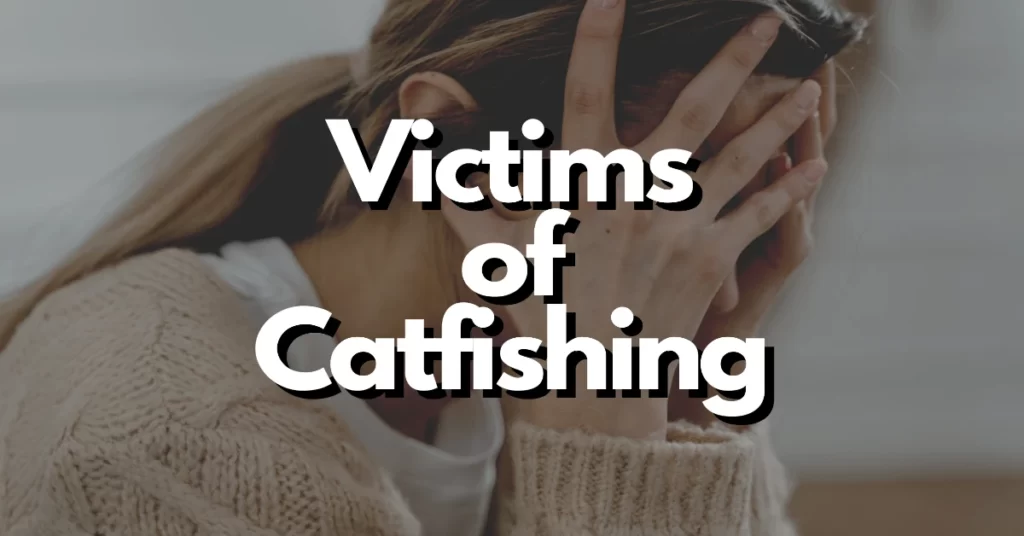Catfishing is a deceptive practice that preys upon individuals’ trust and emotions, leaving a trail of victims in its wake.
In this blog post, we will shed light on the experiences of those who have fallen victim to catfishing. By exploring the stories of these victims, we aim to highlight the devastating impact that catfishing can have on individuals’ lives, relationships, and overall well-being.
Understanding the experiences of catfishing victims is crucial in fostering empathy, raising awareness, and encouraging a safer online environment for all.

Caught in the Web: Understanding the Emotional Toll on Catfishing Victims
Catfishing takes a heavy emotional toll on its victims, leaving them feeling trapped and emotionally scarred. Deception on such an intimate level can lead to a range of negative emotions, including betrayal, shame, embarrassment, and a deep sense of violation.
Victims often experience a loss of self-esteem and struggle with feelings of distrust towards others. The emotional impact can be long-lasting, affecting their ability to form new relationships and navigate future online interactions.
Understanding the profound emotional toll catfishing has on victims is crucial in providing support, empathy, and validation for their experiences.
Rebuilding Trust: Healing and Recovery for Those Deceived by Catfishers
Rebuilding trust after falling victim to catfishing can be a challenging journey for survivors. The process of healing and recovery involves addressing the emotional wounds caused by the deception and gradually learning to trust again.
Rebuilding trust requires a supportive network of friends, family, and professionals who can provide a safe and non-judgmental space for survivors to share their stories, express their emotions, and process their experiences.
Therapy, support groups, and counseling services play a vital role in helping survivors navigate the complex emotions and rebuild their confidence and trust in themselves and others. Rebuilding trust is a gradual process that requires patience, self-compassion, and a commitment to personal growth.
Online Impacts: Exploring the Social and Psychological Consequences for Victims
The social and psychological consequences of catfishing extend beyond the immediate victim. Victims of catfishing often face social repercussions, such as damaged friendships, strained family relationships, or a loss of reputation within their online communities.
The psychological impact can manifest as anxiety, depression, post-traumatic stress disorder (PTSD), or even suicidal thoughts. Victims may also experience a sense of isolation, as they struggle to share their experiences with others who may not fully understand the complexities of catfishing.
Exploring the social and psychological consequences of catfishing helps shed light on the broader impact it has on individuals and emphasizes the need for support, understanding, and empathy for those affected.
Empowering Survivors: Support Networks and Resources for Catfishing Victims
Survivors of catfishing need support, understanding, and access to resources to help them navigate the aftermath of deception. Support networks and resources specifically designed for catfishing victims can play a crucial role in empowering survivors and assisting them in their recovery journey.
Online platforms, helplines, and support groups provide safe spaces for survivors to connect, share experiences, and find solace in the company of others who have gone through similar ordeals.
These networks often offer practical advice, emotional support, and access to resources such as counseling services, legal aid, and information on reporting catfishing incidents. Empowering survivors through support networks helps them regain their voice, reclaim their identity, and move forward with strength and resilience.

Conclusion
In conclusion, the stories of catfishing victims illustrate the profound emotional and psychological harm caused by this deceptive practice. Victims of catfishing often experience betrayal, heartbreak, and a loss of trust in others.
It is important to provide support, resources, and a safe space for victims to share their experiences and heal from the trauma. Additionally, education and awareness initiatives can help individuals recognize the signs of catfishing and protect themselves from falling victim to such deceit.
By amplifying the voices of victims, we can work towards creating a more compassionate and empathetic society that values honesty, authenticity, and respect in all online interactions.

